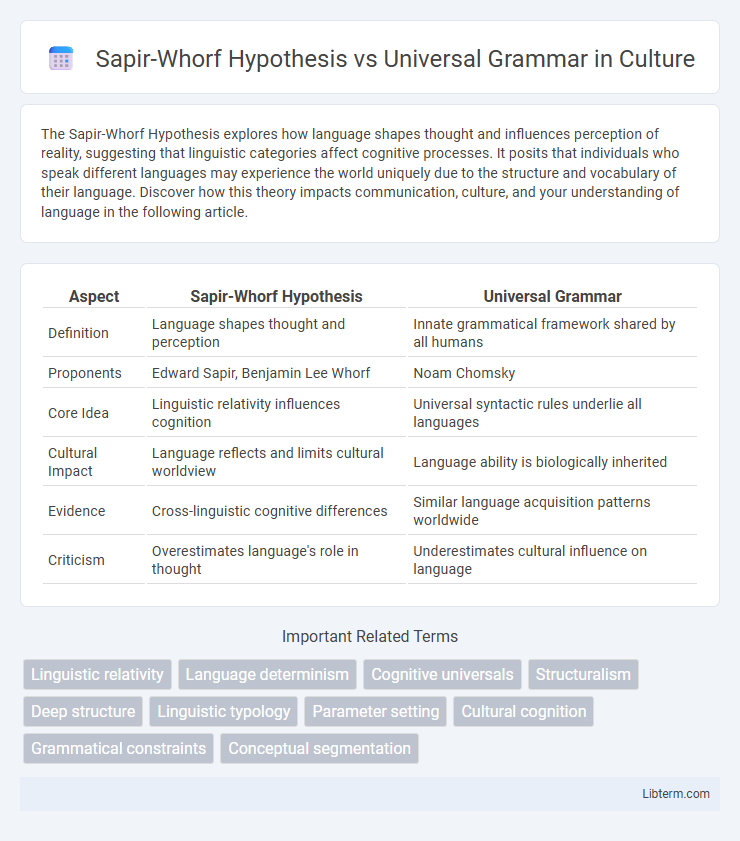The Sapir-Whorf Hypothesis explores how language shapes thought and influences perception of reality, suggesting that linguistic categories affect cognitive processes. It posits that individuals who speak different languages may experience the world uniquely due to the structure and vocabulary of their language. Discover how this theory impacts communication, culture, and your understanding of language in the following article.
Table of Comparison
| Aspect | Sapir-Whorf Hypothesis | Universal Grammar |
|---|---|---|
| Definition | Language shapes thought and perception | Innate grammatical framework shared by all humans |
| Proponents | Edward Sapir, Benjamin Lee Whorf | Noam Chomsky |
| Core Idea | Linguistic relativity influences cognition | Universal syntactic rules underlie all languages |
| Cultural Impact | Language reflects and limits cultural worldview | Language ability is biologically inherited |
| Evidence | Cross-linguistic cognitive differences | Similar language acquisition patterns worldwide |
| Criticism | Overestimates language's role in thought | Underestimates cultural influence on language |
Introduction to Language Theories
The Sapir-Whorf Hypothesis posits that language shapes cognition and perception, emphasizing linguistic relativity and how speakers of different languages experience the world uniquely. Universal Grammar, proposed by Noam Chomsky, argues that the ability to acquire language is innate, with a common structural foundation underlying all human languages. Both theories remain fundamental in the study of language acquisition and cognitive linguistics, offering contrasting views on the interplay between language, thought, and biology.
Defining the Sapir-Whorf Hypothesis
The Sapir-Whorf Hypothesis, also known as linguistic relativity, posits that the structure of a language influences its speakers' cognition and worldview, suggesting that language shapes thought processes. In contrast, Universal Grammar, proposed by Noam Chomsky, argues for an innate, biologically determined linguistic framework common to all humans. The Sapir-Whorf Hypothesis emphasizes the variability of cognitive frameworks driven by linguistic diversity, highlighting how language impacts perception and categorization of reality.
Understanding Universal Grammar
Universal Grammar (UG), a theory developed by Noam Chomsky, posits that humans possess an innate set of grammatical principles shared across all languages, enabling rapid language acquisition. Unlike the Sapir-Whorf Hypothesis, which emphasizes language's influence on thought and perception, UG focuses on the biological basis of language structure embedded in the human brain. Research in linguistics and cognitive science supports UG's role in explaining syntactic universals and the uniformity of language learning despite cultural and linguistic diversity.
Historical Background and Development
The Sapir-Whorf Hypothesis, formulated in the early 20th century by Edward Sapir and Benjamin Lee Whorf, emphasizes the influence of language on thought and perception, suggesting linguistic relativity rather than universality. Universal Grammar, pioneered by Noam Chomsky in the mid-20th century, proposes an innate, biological basis for language with a common underlying structure shared across all human languages. The historical development of these theories reflects a shift from cultural-linguistic determinism toward cognitive and biological frameworks in linguistics.
Key Differences Between the Theories
The Sapir-Whorf Hypothesis proposes that language shapes thought and cognition, emphasizing linguistic relativity, whereas Universal Grammar argues for an innate, biological structure underlying all human languages. While Sapir-Whorf stresses cultural and environmental influence on language perception, Universal Grammar focuses on a shared, prewired mental capacity for language acquisition. Key differences lie in the source of linguistic knowledge--learned through interaction for Sapir-Whorf versus genetically programmed for Universal Grammar.
Linguistic Relativity vs Linguistic Universality
The Sapir-Whorf Hypothesis emphasizes linguistic relativity, proposing that language influences thought and perception, varying across cultures and shaping cognitive processes uniquely. Universal Grammar, formulated by Noam Chomsky, argues for linguistic universality, suggesting innate, genetically encoded grammatical structures shared by all humans regardless of language. This contrast highlights ongoing debates in linguistics between culturally specific language effects and underlying universal cognitive frameworks.
Evidence Supporting the Sapir-Whorf Hypothesis
The Sapir-Whorf Hypothesis, also known as linguistic relativity, is supported by studies demonstrating that language influences cognitive processes, such as perception and memory, evidenced in research on color discrimination and spatial orientation among speakers of different languages. For instance, experiments with speakers of languages lacking certain color terms reveal difficulties in distinguishing those colors, highlighting how language shapes thought patterns. Furthermore, cross-linguistic analyses of time perception and grammatical gender showcase measurable cognitive variations aligned with specific linguistic structures, reinforcing the hypothesis' claim that language constrains or enables particular ways of thinking.
Empirical Support for Universal Grammar
Universal Grammar (UG) has gained substantial empirical support through studies in language acquisition revealing that children across diverse linguistic environments acquire complex grammar rapidly and uniformly, suggesting innate grammatical structures. Neuroimaging and genetic research identify specific brain areas and genes linked to syntactic processing, reinforcing UG's biological basis. In contrast, the Sapir-Whorf Hypothesis, emphasizing linguistic relativity, faces limited empirical validation, as many cognitive processes appear consistent regardless of language differences.
Criticisms and Controversies
The Sapir-Whorf Hypothesis faces criticism for its strong linguistic determinism, which suggests language confines thought, a claim many linguists find overstated and lacking empirical support. Universal Grammar, proposed by Noam Chomsky, encounters controversy regarding its assertion of innate, language-specific structures, with opponents arguing that linguistic diversity challenges the notion of a fixed, prewired grammar. Both theories provoke debate over the extent to which language shapes cognition or is shaped by innate cognitive structures, highlighting ongoing disputes in linguistic and cognitive science research.
Implications for Linguistics and Cognitive Science
The Sapir-Whorf Hypothesis posits that language shapes thought patterns and cognitive processes, suggesting linguistic relativity influences perception and categorization in cognitive science. In contrast, Universal Grammar theory, proposed by Noam Chomsky, argues for an innate, biological language faculty shared across humans, emphasizing structural commonalities in linguistic acquisition. These competing perspectives impact linguistics by framing debates on language determinism versus cognitive universality, influencing research methodologies in psycholinguistics and neurolinguistics.
Sapir-Whorf Hypothesis Infographic

 libterm.com
libterm.com